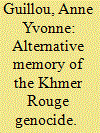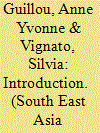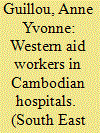|
|
|
Sort Order |
|
|
|
Items / Page
|
|
|
|
|
|
|
| Srl | Item |
| 1 |
ID:
113277


|
|
|
|
|
| Publication |
2012.
|
| Summary/Abstract |
This article contrasts the ways in which the memories of the Khmer Rouge genocide have been constructed at different levels and at different periods since the 1980s. Various actors have been involved in this construction, such as the ruling Cambodian People's Party, the Khmer Rouge Court sponsored by the United Nations since 2007, and Cambodian villagers. This has led to numerous misunderstandings and discrepancies regarding the trial of the former Khmer Rouge leaders. The current research is based on ethnographic fieldwork undertaken in a village in the province of Pursat. It shows how the villagers have taken care of the human remains from the state-sponsored memorials and of the mass graves (that is to say, of the unknown bodies). The article shows how the Khmer popular religious system is instrumental in forging a memory of the dead of the Pol Pot regime and in healing social suffering.
|
|
|
|
|
|
|
|
|
|
|
|
|
|
|
|
| 2 |
ID:
128881


|
|
|
|
|
| Publication |
2013.
|
| Summary/Abstract |
This Special Focus is the second part of 'Life after collective death in South East Asia', a collection of papers examining what happens after wide-scale destruction has occurred and how the social and individual lives of the survivors recover. Part 1, published in South East Asia Research in June 2012 (Vol 20, No 2), focused on the social and religious processes that help the '(re-)fabrication of social bonds'. Part 2 deals with another major aspect of resilience - the issue of help, especially in the case of international humanitarian aid. In many ways, in the contemporary situation, it is taken for granted that help will be provided. We question the evidence for this, asking what rationales are involved in post-catastrophe help. We shed light on why, for example, people decide to engage in non-governmental organizations (NGOs) to help distribute drugs in a Cambodian outpatients ward or, alternatively, to carry rice sacks in the Ayeyarwady Delta to help victims of the typhoon in Myanmar. We highlight why people in the West consider such activities 'normal'. We focus on how people, having been labelled as 'victims', receive and perceive such aid and how they respond to it. Further, we ask how (and to what extent) aid contributes to change, implicitly or explicitly, in the societies affected. Finally, we question what contemporary international aid brings when compared to the older local relief systems and systems of mutual help, particularly those examined in Part 1.
|
|
|
|
|
|
|
|
|
|
|
|
|
|
|
|
| 3 |
ID:
128883


|
|
|
|
|
| Publication |
2013.
|
| Summary/Abstract |
Since the Khmer Rouge genocide (1975-79), Cambodia has been constructed as a victim par excellence, which exists only through Western financial aid and compassion. In this ideological context, non-governmental organizations (NGOs) mushroomed by the hundreds in the 1980s in the refugee camps along the Cambodia-Thailand border. They then flowed into Cambodia during the repatriation process under UNHCR supervision in the early 1990s. Because of the financial weakness of the Cambodian government at that time (when support from the USSR and other socialist countries abruptly ceased), the NGOs gained a powerful position as institutional partners of the government. Taking the example of the medical sector, this article analyses humanitarian ideology and its implementation in Cambodian hospitals in the 1990s. The author explores the contradiction between the Westerners' 'philosophy of development' versus the Cambodians' 'ethic of gift', based on an ethnographical account of the daily activities in Cambodian hospitals, from an interactionist perspective. The author observes the interactions between the Cambodian staff, the humanitarian NGO staff, the patients and their families, showing how the divergence of moral values, the historical construction of the medical profession and social games create conflict between the humanitarians and the Cambodians. This has a direct impact on the patient-physician relationship. Finally, while millions of dollars and thousands of hours of humanitarian work have been spent in Cambodia, some major public health indices have not been greatly improved.
|
|
|
|
|
|
|
|
|
|
|
|
|
|
|
|
|
|
|
|
|